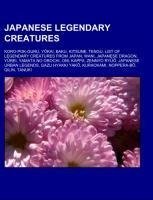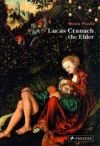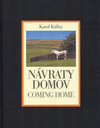
-
 Anglický jazyk
Anglický jazyk
Japanese legendary creatures
Autor: Source: Wikipedia
Source: Wikipedia. Pages: 117. Chapters: Koro-pok-guru, Yokai, Baku, Kitsune, Tengu, List of legendary creatures from Japan, Wani, Japanese dragon, Yurei, Yamata no Orochi, Oni, Kappa, Zennyo Ryuo, Japanese urban legends, Gazu Hyakki Yako, Kuraokami, Noppera-bo,... Viac o knihe
Na objednávku, dodanie 2-4 týždne
25.38 €
bežná cena: 28.20 €
O knihe
Source: Wikipedia. Pages: 117. Chapters: Koro-pok-guru, Yokai, Baku, Kitsune, Tengu, List of legendary creatures from Japan, Wani, Japanese dragon, Yurei, Yamata no Orochi, Oni, Kappa, Zennyo Ryuo, Japanese urban legends, Gazu Hyakki Yako, Kuraokami, Noppera-bo, Qilin, Tanuki, Kuchisake-onna, Bakeneko, Jorogumo, Preta, Mizuchi, Onibaba, Konjaku Hyakki Shui, Yuki-onna, Shisa, Yama-uba, Tsukumogami, Futakuchi-onna, Binbogami, Hannya, Ningyo, Obake, Rokurokubi, Ushi-oni, Tennin, Hitodama, Tsuchigumo, Mujina, Nue, Konjaku Gazu Zoku Hyakki, Kuzuryu, Amabie, Gazu Hyakki Tsurezure Bukuro, Kuda-gitsune, Inugami, Onryo, My Lord Bag of Rice, Hibagon, Sin-you, Ehon Hyaku Monogatari, Amanojaku, Zashiki-warashi, Bai Ze, Nukekubi, Shinigami, Kijimuna, Umibozu, Ashinagatenaga, Abura-akago, Kasa-obake, Gashadokuro, Kodama, Sankai, Samebito, Hyottoko, Aobozu, Goryo, Nurarihyon, Tsuchinoko, Raiju, Harionago, Datsue-ba, Kamaitachi, Penghou, Namazu, Keukegen, Isonade, Jikininki, Abura-sumashi, Nurikabe, Hyakkai-Zukan, Azukiarai, Ubume, Chochinobake, Nuppeppo, Nure-onna, Jinmenju, Hitotsume-kozo, Shikigami, Ikiryo, Karura, Akaname, Wanyudo, Hashihime, Amemasu, Yofune-nushi, The Ghost of Oyuki, Akashita, Sazae-oni, Yosei, Tsurube-otoshi, Amanozako, Shikome, Hiderigami, Aoandon, Uwan, Amefurikozo, Shachihoko, Funayurei, Ittan-momen, Ameonna, Hone-onna, Keneo, Akateko, Yama-bito, Okubi, Abumi-guchi, Satori, Akkorokamui, Aosaginohi, Ashi-magari, Amazake-babaa, Omagatoki, Shuten-doji, Yobuko, Yato-no-kami, Akurojin-no-hi, Daidarabotchi, Bakezori, Mokumokuren, Enenra, Basan, Arikura-no-baba, Yadokai, Miage-nyudo, Amoronagu, Kubikajiri. Excerpt: Kitsune , IPA: ) is the Japanese word for fox. Foxes are a common subject of Japanese folklore; in English, kitsune refers to them in this context. Stories depict them as intelligent beings and as possessing magical abilities that increase with their age and wisdom. Foremost among these is the ability to assume human form. While some folktales speak of kitsune employing this ability to trick others-as foxes in folklore often do-other stories portray them as faithful guardians, friends, lovers, and wives. Foxes and human beings lived close together in ancient Japan; this companionship gave rise to legends about the creatures. Kitsune have become closely associated with Inari, a Shinto kami or spirit, and serve as its messengers. This role has reinforced the fox's supernatural significance. The more tails a kitsune has-they may have as many as nine-the older, wiser, and more powerful it is. Because of their potential power and influence, some people make offerings to them as to a deity. A nine-tailed fox, from the Qing edition of the ancient text Shan Hai Jing.It is widely agreed that many fox myths in Japan can be traced to China, Korea, or India. Chinese folk tales tell of fox spirits (called Huli-jing) that may have up to nine tails, or Kyubi no Kitsune in Japanese. Many of the earliest surviving stories are recorded in the Konjaku Monogatari, an 11th-century collection of Chinese, Indian, and Japanese narratives. There is debate whether the kitsune myths originated entirely from foreign sources or are in part an indigenous Japanese concept dating as far back as the fifth century BC. Japanese folklorist Kiyoshi Nozaki argues that the Japanese regarded kitsune positively as early as the 4th century A.D.; the only things imported from China or Korea were the kitsune's negative attributes. He states that, according to a 16th...
- Vydavateľstvo: Books LLC, Reference Series
- Rok vydania: 2017
- Formát: Paperback
- Rozmer: 246 x 189 mm
- Jazyk: Anglický jazyk
- ISBN: 9781157107569







 Ruský jazyk
Ruský jazyk 



 Nemecký jazyk
Nemecký jazyk 
